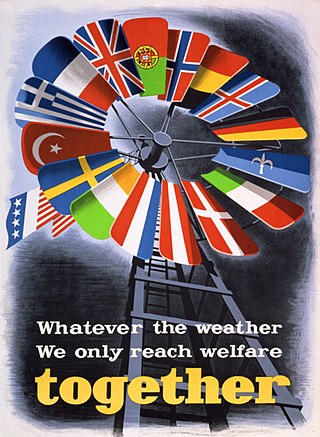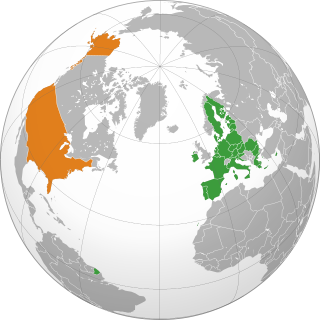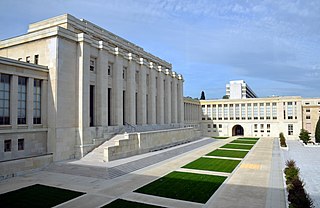Related Research Articles

The World Trade Organization (WTO) is an intergovernmental organization that regulates and facilitates international trade. With effective cooperation in the United Nations System, governments use the organization to establish, revise, and enforce the rules that govern international trade. It officially commenced operations on 1 January 1995, pursuant to the 1994 Marrakesh Agreement, thus replacing the General Agreement on Tariffs and Trade (GATT) that had been established in 1948. The WTO is the world's largest international economic organization, with 164 member states representing over 98% of global trade and global GDP.

The Reciprocal Tariff Act provided for the negotiation of tariff agreements between the United States and separate nations, particularly Latin American countries. The Act served as an institutional reform intended to authorize the president to negotiate with foreign nations to reduce tariffs in return for reciprocal reductions in tariffs in the United States up to 50%. It resulted in a reduction of duties. This was the policy of the low tariff Democrats in response to the high tariff Republican program which produced the Smoot–Hawley tariff of 1930 that raised rates, and sharply reduced international trade. The Reciprocal Tariff Act was promoted heavily by Secretary of State Cordell Hull.
In international relations, multilateralism refers to an alliance of multiple countries pursuing a common goal.
Bilateralism is the conduct of political, economic, or cultural relations between two sovereign states. It is in contrast to unilateralism or multilateralism, which is activity by a single state or jointly by multiple states, respectively. When states recognize one another as sovereign states and agree to diplomatic relations, they create a bilateral relationship. States with bilateral ties will exchange diplomatic agents such as ambassadors to facilitate dialogues and cooperations.

Atlanticism, also known as Transatlanticism, is the ideology which advocates ever closer alliance between nations in Northern America and in Europe on political, economic, and defense issues. The purpose is to maintain or increase the security and prosperity of the participating countries and protect liberal democracy and the progressive values of an open society that unite them under multiculturalism. The term derives from the North Atlantic Ocean, which is bordered by North America and Europe.

Transatlantic relations refer to the historic, cultural, political, economic and social relations between countries on both side of the Atlantic Ocean. Sometimes it specifically means relationships between the Anglophone North American countries, and particular European countries or organizations, although other meanings are possible.
Global governance refers to institutions that coordinate the behavior of transnational actors, facilitate cooperation, resolve disputes, and alleviate collective action problems. Global governance broadly entails making, monitoring, and enforcing rules. Within global governance, a variety of types of actors – not just states – exercise power. Governance is thus broader than government.

An international environmental agreement or sometimes environmental protocol, is a type of treaty binding in international law, allowing them to reach an environmental goal. In other words, it is "an intergovernmental document intended as legally binding with a primary stated purpose of preventing or managing human impacts on natural resources."

Relations between the European Union and the United States began in 1953, when US diplomats visited the European Coal and Steel Community in addition to the national governments of its six founding countries. The two parties share a good relationship which is strengthened by NATO, cooperation on trade, and shared values.

The IBSA Dialogue Forum is an international tripartite grouping for promoting international cooperation among these countries. It represents three important poles for galvanizing South–South cooperation and greater understanding between three important continents of the developing world namely, Africa, Asia, and South America. The forum provides the three countries with a platform to engage in discussions for cooperation in the field of agriculture, trade, culture, and defence among others.
Economic diplomacy is a form of diplomacy that uses the full spectrum of economic tools of a state to achieve its national interests. The scope of economic diplomacy can encompass all of the international economic activities of a state, including, but not limited to, policy decisions designed to influence exports, imports, investments, lending, aid, free trade agreements, among others.

The Federal Public Service Foreign Affairs, Foreign Trade and Development Cooperation is the foreign affairs ministry of Belgium and is responsible for Belgian foreign policy, relations with the European Union, development cooperation policy and certain aspects of foreign trade policy. The central government in Brussels directs the network of diplomatic and consular representations abroad.

An international organization, also known as an intergovernmental organization or an international institution, is an organization that is established by a treaty, or is an instrument governed by international law and possessing its own legal personality, such as the United Nations, the World Health Organization, Save the Children International, International Union for Conservation of Nature, and NATO. International organizations are composed of primarily member states, but may also include other entities, such as other international organizations, firms, and nongovernmental organizations. Additionally, entities may hold observer status. An alternative definition is that an international organization is a stable set of norms and rules meant to govern the behavior of states and other actors in the international system.
Labour standards in the World Trade Organization are binding rules, which form a part of the jurisprudence and principles applied within the rule making institutions of the World Trade Organization (WTO). Labour standards play an implicit, but not an overt role within the WTO, however it forms a prominent issue facing the WTO today, and has generated a wealth of academic debate.
Environmental governance (EG) consist of a system of laws, norms, rules, policies and practices that dictate how the board members of an environment related regulatory body should manage and oversee the affairs of any environment related regulatory body which is responsible for ensuring sustainability (sustainable development) and manage all human activities—political, social and economic. Environmental governance includes government, business and civil society, and emphasizes whole system management. To capture this diverse range of elements, environmental governance often employs alternative systems of governance, for example watershed-based management.

European Union–Iran relations are the bilateral relations between Iran and the European Union (EU). The EU is Iran's largest trading partner, along with China and the United Arab Emirates. Trade with Iran is subject to the general EU import regime and the EU supports the goal of Iranian accession to the World Trade Organization (WTO). The EU has accused and criticized Iran for human rights violations, which led to diplomatic tensions, but both sides aim at improving and normalizing relations.
Sea transport accounts for most of the European Union's external and internal commerce. The EU is the world's third-largest importer of fisheries and aquaculture products and the fifth-largest producer. Maritime borders make up more than 70% of the Union's external borders, and hundreds of millions of travelers pass through European ports each year. The security of Europe's energy supply is heavily reliant on marine transit and infrastructure. The significant expansion of EU Member States' fleets, as well as suitable port infrastructure, contribute to a well-functioning energy market and supply security, and hence to European residents' and the European economy's overall well-being. The Arctic region is therefore a vital new area for the EU to work towards and a new strategy for the Arctic region that matches with the European Green deal was established in late 2021.
International sanctions are political and economic decisions that are part of diplomatic efforts by countries, multilateral or regional organizations against states or organizations either to protect national security interests, or to protect international law, and defend against threats to international peace and security. These decisions principally include the temporary imposition on a target of economic, trade, diplomatic, cultural or other restrictions that are lifted when the motivating security concerns no longer apply, or when no new threats have arisen.
The People's Republic of China emerged as a great power and one of the three big players in the tri-polar geopolitics (PRC-US-USSR) during the Cold War, after the Korean War in 1950-1953 and the Sino-Soviet split in the 1960s, with its status as a recognized nuclear weapons state in 1960s. Currently, China has one of the world's largest populations, second largest GDP (nominal) and the largest economy in the world by PPP. China is now considered an emerging global superpower.
There are various theoretical frameworks to mitigate climate change. Frameworks are significant in that they provide a lens through which an argument can be addressed, and can be used to understand the possible angles from which to approach solving climate change. Frameworks in political science are used to think about a topic from various angles in order to understand different perspectives of the topic; common ones in international political science include rationalist, culturalist, marxist, and liberal institutionalist. See international relations theory for more frameworks through which problems can be analyzed.
References
- ↑ "Unilateralism (n.)." Online Etymology Dictionary.
- ↑ "Confrontation, Unilateral Action, Interference in States' Internal Affairs Must Yield to Dialogue, Cooperation, Speakers Stress at Annual General Assembly Debate - World | ReliefWeb". 24 September 2022.
- ↑ Essentials of International Relations (Ninth Edition) 9th Edition, Kindle Edition by Karen A. Mingst